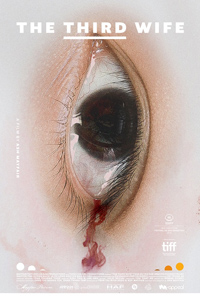Raise the Red Lanterns: Mayfair Falls Short on Accessing Modernity in Ancient Times
 A new voice in Vietnamese cinema, Ash Mayfair‘s female-centric coming-of-age feature debut The Third Wife was produced with the help of Spike Lee’s foundation. Although it presents a traditional 19th century reality, the historical narrative is narrowly affiliated to a casual gaze, deliberately focusing on modern matters through a ready-made approach, with the feminist discourse filtered through a melancholic depiction of nature and religion. The film reads as a collection of individual dramas replayed over and over in the hearts of those who stay confined to the margins of the patriarchal reality. Unfortunately, Mayfair’s Vietnam is lacking the dust and the imperfections that made Vietnamese cinema special so far. This definitely reflects on the outcome of what the film’s tries to convey, being a tale too beautiful on the outside, but echoing with a feeling of emptiness on the inside.
A new voice in Vietnamese cinema, Ash Mayfair‘s female-centric coming-of-age feature debut The Third Wife was produced with the help of Spike Lee’s foundation. Although it presents a traditional 19th century reality, the historical narrative is narrowly affiliated to a casual gaze, deliberately focusing on modern matters through a ready-made approach, with the feminist discourse filtered through a melancholic depiction of nature and religion. The film reads as a collection of individual dramas replayed over and over in the hearts of those who stay confined to the margins of the patriarchal reality. Unfortunately, Mayfair’s Vietnam is lacking the dust and the imperfections that made Vietnamese cinema special so far. This definitely reflects on the outcome of what the film’s tries to convey, being a tale too beautiful on the outside, but echoing with a feeling of emptiness on the inside.
As the red lanterns are raised, announcing the arrival of the third wife May, the vertical ray of sun suggests that the summer has ended, making the smell of green papaya rather nostalgic. That means a newcomer must carry her burden and give birth to a successor to the family, prolonging the ancestry. Somewhere in this patriarchal universe there’s a cycle hopelessly falling for someone, while forbidden love is in the air. Nature’s flow mirrors that of the protagonist’s soul – with the changing of the seasons, thoughts of sexual liberation come to May, prompting an eventual coming-of-age. Although arranged marriages and births are still a serious problem in modern Vietnam, Mayfair struggles with the period setting of the story, particularly when it comes to finding the right balance between the transcendental dimension of the film’s first half and the introduction of more contemporary themes.
It’s only natural to see traces of Anh Hung Tran’s brush on this painting, with the veteran director’s artistic mentorship apparent both visually and tonally, but The Third Wife fails to reach similar heights in term of resonance and empathy. Even Nu Yen-Khe Tran (as the first wife), isn’t enough despite the added weight she brings to the role from Anh Hung Tran’s previous films. Nevertheless, she gives a complex performance as a woman being overshadowed by upcoming youth, at the same time symbolizing the objectification of the woman’s figure and the uncertainty of aesthetic values. There are echoes of Zhang Yimou’s Raise the Red Lantern (1991), though no lantern shines that brightly in Mayfair’s world.
Even though the director follows Tran’s artistic principles quite carefully, she’s breaking off on her own in terms of film language. With a traditional – and almost fauvistic – approach to color, she frames May’s crimson lips beautifully, perpetually contracted to emphasize her helpless silence and frustrated fantasies, the mark of her obligations to patriarchy.
On the other hand, it all contributes to an idealized portrayal of characters and places, perhaps revealing how the film wasn’t made by a native Vietnamese – not quite verging on Memoirs of a Geisha territory, but certainly developed with a keen, audience-friendly eye. Mayfair offers a takeaway of beautiful postcards depicting her trip to Vietnam’s past: beautiful in form, yet signed mostly in Tran’s handwriting. She’s still missing her own words on the back, but as a newcomer she already found a brave voice, singing in high C.
Reviewed on October 20th at the 2018 Warsaw International Film Festival – Competition 1-2. 96 Mins. Part of the The Fipresci Warsaw Critics Project.
★★★/☆☆☆☆☆


